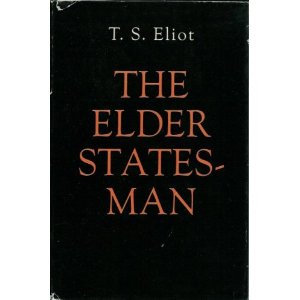
 I’ve recently been floored by T.S. Eliot’s last play “The Elder Statesman.” Eliot’s plays at their best speak with universal brilliance while remaining true to a moving plot. This play tells the story of a retired politician, Lord Claverton, whose past sins have come to back to haunt him. This brief series will reflect on some of the high points of this play in four manageable topics.
I’ve recently been floored by T.S. Eliot’s last play “The Elder Statesman.” Eliot’s plays at their best speak with universal brilliance while remaining true to a moving plot. This play tells the story of a retired politician, Lord Claverton, whose past sins have come to back to haunt him. This brief series will reflect on some of the high points of this play in four manageable topics.
“Perhaps I’ve never really enjoyed living
As much as most people. At least, as they seem to do.
Without knowing that they enjoy it. Whereas I’ve often known
That I didn’t enjoy it. Some dissatisfaction
With myself, I suspect, very deep within myself
Has impelled me all my life to find justification
Not so much to the world – first of all to myself.
What is this self inside us, this silent observer,
Severe and speechless critic, who can terrorise us
And urge us on to futile activity,
And in the end, judge us still more severely
For the errors into which his own reproaches drove us?”
 The passage above is a perfect description of what theology calls self-justification. We live with a gnawing dissatisfaction with our life and ourselves that pollutes even the simplest of pleasures. For Eliot, the source of this unending dissatisfaction is a “speechless critic” – a figure of judgment. In the face of this criticism (either self-imposed, divine, or a 3rd-party) we seek to satisfy this insatiable and mercurial inner-voice.
The passage above is a perfect description of what theology calls self-justification. We live with a gnawing dissatisfaction with our life and ourselves that pollutes even the simplest of pleasures. For Eliot, the source of this unending dissatisfaction is a “speechless critic” – a figure of judgment. In the face of this criticism (either self-imposed, divine, or a 3rd-party) we seek to satisfy this insatiable and mercurial inner-voice.
We reinvent ourselves in hopes that our new clothes would fit better. Yet this “self” is more constricting and dissatisfied than the one we discarded. The project of self-justification is a self-perpetuating cycle of depression and “futile activity.” With each new attempt, the problem only gets worse.
To read the next installment, dealing with the sins of the past, click here.

COMMENTS
5 responses to “T. S. Eliot’s "The Elder Statesman" – Part 1 of 4”
Leave a Reply













Woah. I'm floored. This is as good as it gets. Can't wait to read more, T.
This is truly profound. Thank you.